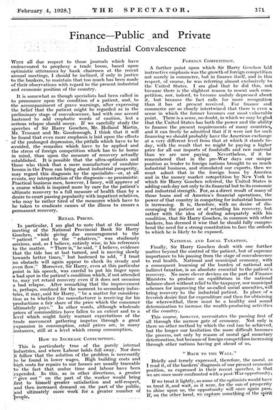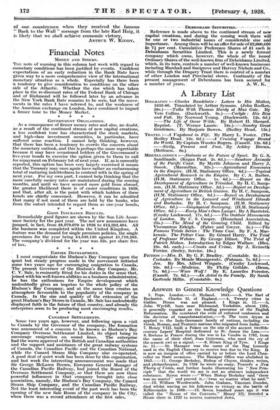Finance Public and Private
Industrial Convalescence
WITH all due respect to those journals which have endeavoured to prophesy a trade boom, based upon optimistic utterances by bank chairmen at the recent annual meetings, I should be inclined, if only in justice to the bankers, to maintain that too much has been made of their observations with regard to the present industrial and economic position of the country.
It is somewhat as though specialists had been called in to pronounce upon the condition of a patient, and, to the accompaniment of grave warnings, after expressing the belief that the patient might be regarded as in the preliminary stage of convalescence, had with one accord hastened to add emphatic words of caution, lest a serious relapse should occur. If we carefully study the speeches of Sir Harry Goschen, Mr. Holland Martin, Mr. Tennant and Mr. Goodenough, I think that it will be found that even more emphasis is laid upon the effects of the prolonged depression, the pitfalls which have to be avoided, the - remedies which have to be applied - and the stress of foreign competition which has to be borne in mind, than upon the measure of recovery actually established. It is possible that the ultra-optimists and those who think that a mere manufacture of sunshine booms in the Press can bring about industrial prosperity, may regard this diagnosis by the specialists—or, at all events, my interpretation of the diagnosis—as pessimistic. Practical business men, however, I fancy, will approve of a course which is inspired more by care for the patient's ultimate recovery to a full measure of health than by a desire to court passing popularity with impatient relatives, who may be rather tired of the measures which have to be taken to eradicate causes of the illness to ensure a permanent recovery.
RETAIL PRICES.
In particular, I am glad to note that at the annual meeting of the National Provincial Bank Sir Harry Goschen, while giving due encouragement to the patient " and to the " relatives," was studiously anxious, and, as I believe, entirely wise, in his references to the matter. " There is," he said, " I believe, evidence that the tide has at last turned, and is moving. slowly :towards better times," but hastened to add, I trust no obstacle will again appear to check its steady and seven flow." Moreover, Sir Harry, even at this particular point in his speech, was careful to put his finger upon a bad spot in the patient's condition which, if not attended to, may yet retard recovery even if it does not occasion a bad relapse. After remarking that the improvement is, perhaps, confined for the moment to secondary indus- tries, it may, said Sir Harry, " be a matter for considera- tion as to whether the manufacturer is receiving for his productions a fair share of the price which the consumer 'ultimately pays." In other words, although wholesale prices of commodities have fallen to an extent and to a level which .might fairly warrant expectations of the trade movement gathering impetus through a great -expansion in consumption, retail prices are, in many instances, still at a leyel which cramp consumption.
How TO INCREASE CONSUMPTION.
This is particularly true of the purely internal industries, and where Labour holds full sway. Nor does it follow that the solution of the problem is necessarily to be found in lower wages. High building costs and thigh costs 'for repairs to our houses are usually traceable to the fact that undue time and labour have been ;expended. In this, as in other directions, a greater !" give out " on the part of the worker would bring :first to himself greater satisfaction and self-respect, and then increased, demand - on _the part of the public, and ultimately more Work. for a greater number of 13eople. FOREIGN COMPETITION.
A further point upon which Sir Harry Goschen laid instructive emphasis was the growth of foreign competition not merely in commerce, but in finance itself, and in this respect, of course, he was referring almost exclusively to the United States. I am glad that he did this, not because there is the slightest reason to resent such com- petition, nor, indeed, to become unduly depressed about it, but because the fact calls for more recognition than it has at present received. For finance and commerce are so closely intertwined that there is even a sense in which the former becomes our most vulnerable point. There is a sense, no doubt, in which we may be glad that thesUnited States has both the power and the ability to finance the present requirements of many countries, and it can freely be admitted that if it were not for such financing we should probably have the American exchange at a very different level from that at which it stands to- day, with the result that we might be paying a higher price for all our imports of foodstuffs and raw material than we are now paying. Nevertheless, if it be remembered that in the pre-War days our unique position as lender to foreign nations brought to us much industrial business, and stimulated our exports, then we must admit that in the foreign loans by America and in the money market competition by New York to which Sir Harry Goschen referred, the United States is adding each day not only to its financial but to its economic and industrial, strength. For, as a direct result of many of a those loans and of America's financial operations, the power of that country in competing for industrial business is increasing. It is, therefore, with no desire of dis- couraging the patient or of retarding his recovery, but rather with the idea of dealing adequately with his condition, that Sir Harry Goschen, in common with other bankers, has deemed it wise that he should fully compre- hend the need for a strong constitution to face the ordeals to which he is likely to be exposed.
NATIONAL AND LOCAL TAXATION.
Finally, Sir Harry Goschen dealt with one further matter beyond the control of the patient, but of supreme importance to his passing from the stage of convalescence to real health. National and municipal economy, with a consequent lessening of the burden of national and indirect taxation, is an absolute essential to the patient's recovery. No mere clever devices on the part of Finance Ministers to produce an equilibrium in the national balance-sheet without relief to the taxpayer, nor municipal schemes for improving the so-called social amenities, will bring recovery to the industrial patient. In place of a feverish desire first for expenditure and then for obtaining the wherewithal, there must be a healthy and sound determination to increase the wealth-producing activities of the country.
This course, however, necessitates the passing first of all through the narrow gate of economy. Not only is there no other method by which the end can be achieved, but the longer our hesitation the more difficult becomes the process, not only by reason of moral f,,,pd monetary deterioration, but because of foreign competition increasing through other nations having got ahead of us.
• " BACK TO THE WALL."
Briefly and tersely expressed, therefore, the moral, as I read it, of the bankers' diagnosis of our present economic position, as expressed in their recent speeches, is that we are once more confronted with a post-War opportunity.
If we treat it lightly, as some of the optimists would have us treat it, and wait, as it were, for-the sun of prosperity to shine upon us, the opportunity will once again pass. If, on the other hand oye capture something of the spirit of our.. countrymen when they received the famous " Back to the Wall " message from the late Earl Haig, it is likely that we shall achieve economic victory.
ARTHUR W. KIDDY.







































 Previous page
Previous page